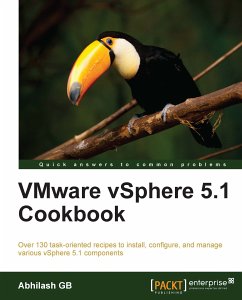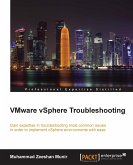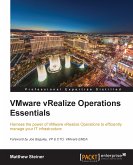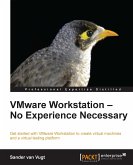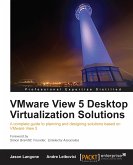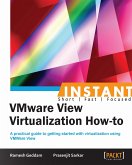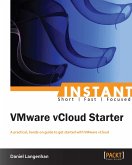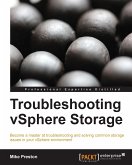Amidst all the recent competition from Citrix and Microsoft, VMware's vSphere product line is still the most feature rich and futuristic product in the virtualization industry. Knowing how to install and configure vSphere components is important to give yourself a head start towards virtualization using VMware.
If you want to quickly grasp the installation and configuration procedures, especially by using the new vSphere 5.1 web client, this book is for you.VMware vSphere 5.1 Cookbook will take you through all the steps required to accomplish a task with minimal reading required. Most of the tasks are accompanied with relevant screenshots with an intention to provide a visual guidance as well.The book has many useful recipes that will help you progress through the installation of VMware ESXi 5.1 and vCenter Server 5.1. You will learn to use Auto Deploy and Image Profiles to deploy stateless/stateful ESXi servers, configure failover protection for virtual machines using vSphere HA, configure automated load balancing using vSphere DRS and DPM.
Finally, the book guides you through upgrading or patching ESXi servers using VMware Update Manager and also deploying and configuring vSphere Management Assistant (VMA) to be able to run scripts to manage the ESXi servers.
If you want to quickly grasp the installation and configuration procedures, especially by using the new vSphere 5.1 web client, this book is for you.VMware vSphere 5.1 Cookbook will take you through all the steps required to accomplish a task with minimal reading required. Most of the tasks are accompanied with relevant screenshots with an intention to provide a visual guidance as well.The book has many useful recipes that will help you progress through the installation of VMware ESXi 5.1 and vCenter Server 5.1. You will learn to use Auto Deploy and Image Profiles to deploy stateless/stateful ESXi servers, configure failover protection for virtual machines using vSphere HA, configure automated load balancing using vSphere DRS and DPM.
Finally, the book guides you through upgrading or patching ESXi servers using VMware Update Manager and also deploying and configuring vSphere Management Assistant (VMA) to be able to run scripts to manage the ESXi servers.

